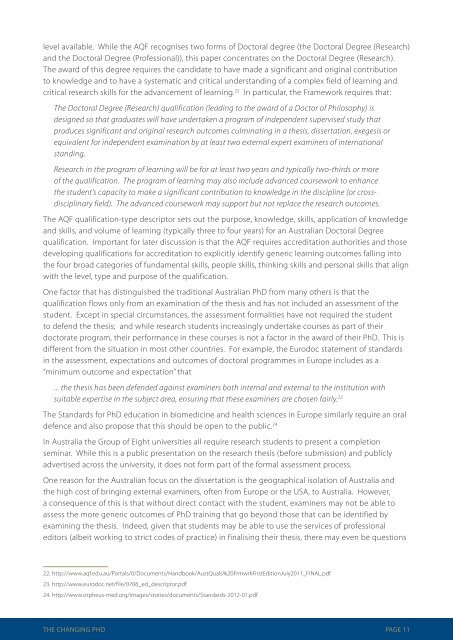the-changing-phd_final
the-changing-phd_final
the-changing-phd_final
You also want an ePaper? Increase the reach of your titles
YUMPU automatically turns print PDFs into web optimized ePapers that Google loves.
level available. While <strong>the</strong> AQF recognises two forms of Doctoral degree (<strong>the</strong> Doctoral Degree (Research)<br />
and <strong>the</strong> Doctoral Degree (Professional)), this paper concentrates on <strong>the</strong> Doctoral Degree (Research).<br />
The award of this degree requires <strong>the</strong> candidate to have made a significant and original contribution<br />
to knowledge and to have a systematic and critical understanding of a complex field of learning and<br />
critical research skills for <strong>the</strong> advancement of learning. 22 In particular, <strong>the</strong> Framework requires that:<br />
The Doctoral Degree (Research) qualification (leading to <strong>the</strong> award of a Doctor of Philosophy) is<br />
designed so that graduates will have undertaken a program of independent supervised study that<br />
produces significant and original research outcomes culminating in a <strong>the</strong>sis, dissertation, exegesis or<br />
equivalent for independent examination by at least two external expert examiners of international<br />
standing.<br />
Research in <strong>the</strong> program of learning will be for at least two years and typically two-thirds or more<br />
of <strong>the</strong> qualification. The program of learning may also include advanced coursework to enhance<br />
<strong>the</strong> student’s capacity to make a significant contribution to knowledge in <strong>the</strong> discipline (or crossdisciplinary<br />
field). The advanced coursework may support but not replace <strong>the</strong> research outcomes.<br />
The AQF qualification-type descriptor sets out <strong>the</strong> purpose, knowledge, skills, application of knowledge<br />
and skills, and volume of learning (typically three to four years) for an Australian Doctoral Degree<br />
qualification. Important for later discussion is that <strong>the</strong> AQF requires accreditation authorities and those<br />
developing qualifications for accreditation to explicitly identify generic learning outcomes falling into<br />
<strong>the</strong> four broad categories of fundamental skills, people skills, thinking skills and personal skills that align<br />
with <strong>the</strong> level, type and purpose of <strong>the</strong> qualification.<br />
One factor that has distinguished <strong>the</strong> traditional Australian PhD from many o<strong>the</strong>rs is that <strong>the</strong><br />
qualification flows only from an examination of <strong>the</strong> <strong>the</strong>sis and has not included an assessment of <strong>the</strong><br />
student. Except in special circumstances, <strong>the</strong> assessment formalities have not required <strong>the</strong> student<br />
to defend <strong>the</strong> <strong>the</strong>sis; and while research students increasingly undertake courses as part of <strong>the</strong>ir<br />
doctorate program, <strong>the</strong>ir performance in <strong>the</strong>se courses is not a factor in <strong>the</strong> award of <strong>the</strong>ir PhD. This is<br />
different from <strong>the</strong> situation in most o<strong>the</strong>r countries. For example, <strong>the</strong> Eurodoc statement of standards<br />
in <strong>the</strong> assessment, expectations and outcomes of doctoral programmes in Europe includes as a<br />
“minimum outcome and expectation” that<br />
... <strong>the</strong> <strong>the</strong>sis has been defended against examiners both internal and external to <strong>the</strong> institution with<br />
suitable expertise in <strong>the</strong> subject area, ensuring that <strong>the</strong>se examiners are chosen fairly. 23<br />
The Standards for PhD education in biomedicine and health sciences in Europe similarly require an oral<br />
defence and also propose that this should be open to <strong>the</strong> public. 24<br />
In Australia <strong>the</strong> Group of Eight universities all require research students to present a completion<br />
seminar. While this is a public presentation on <strong>the</strong> research <strong>the</strong>sis (before submission) and publicly<br />
advertised across <strong>the</strong> university, it does not form part of <strong>the</strong> formal assessment process.<br />
One reason for <strong>the</strong> Australian focus on <strong>the</strong> dissertation is <strong>the</strong> geographical isolation of Australia and<br />
<strong>the</strong> high cost of bringing external examiners, often from Europe or <strong>the</strong> USA, to Australia. However,<br />
a consequence of this is that without direct contact with <strong>the</strong> student, examiners may not be able to<br />
assess <strong>the</strong> more generic outcomes of PhD training that go beyond those that can be identified by<br />
examining <strong>the</strong> <strong>the</strong>sis. Indeed, given that students may be able to use <strong>the</strong> services of professional<br />
editors (albeit working to strict codes of practice) in <strong>final</strong>ising <strong>the</strong>ir <strong>the</strong>sis, <strong>the</strong>re may even be questions<br />
22. http://www.aqf.edu.au/Portals/0/Documents/Handbook/AustQuals%20FrmwrkFirstEditionJuly2011_FINAL.pdf<br />
23. http://www.eurodoc.net/file/0706_ed_descriptor.pdf<br />
24. http://www.orpheus-med.org/images/stories/documents/Standards-2012-01.pdf<br />
THE CHANGING PHD PAGE 11


